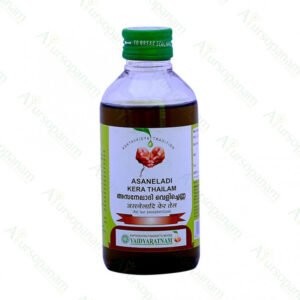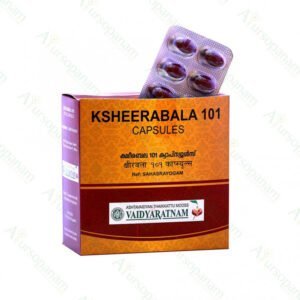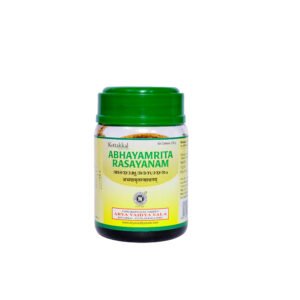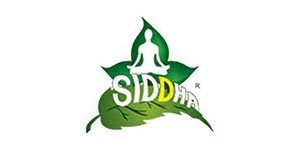Chemparuthyadi Kera Thailam is an oil that finds its original reference in the Arogyakalpadruma, an authentic Ayurvedic text on paediatrics. It has been in vogue for a long time for its cherished therapeutic efficacy in maintaining healthy skin and scalp. It has been indicated for both Abhyanga (body massage) and Moordhataila Prayoga (application of oil to the head)
‘Moordhataila’, the application of oil on the head is a practice endorsed by Ayurveda scriptures. The head is the most significant part of the body. It encompasses eight vital opening the eyes, ears, nose and mouth and one significant but subtle access point to the well being of body the crown of the head.
Application of oil on the head, while imparting obvious and sustained health to your tresses, at a more subtle level, it works effortlessly towards the well-being of your entire body.
Features & Benefits
- Chemparuthyadi Kera Thailam is coconut oil infused with the healing properties of Japapatra ( Hibiscus rosasinensis), Vilwapatra (Aegle marmelos), Paranti (Ixora coccinea),Nagavalli (Piper betle), Krishnathulasi (Occimum tenuiiflorum), Nili Indigofera tinctoria), Vasini (Biophytum sensitivum), Thamalaki (Phyllanthus niruri), Jeera (Cuminum cyminum and Krishnajeera (Nigella sativa).
- It is an excellent remedy for itching, ulceration and oozing associated with scabies, eczema, pruritus and other skin disorders.
- Chemparuthyadi Kera Thailam has distinct efficacy in keeping away infections of the skin and scalp. Nagavalli, Vilwa patra and Paranti have distinct Krimihara and Bhootaghna action (anti-microbial).
- Nili and Japa strengthen hair roots and strands. Regular use yields healthy and shiny hair. Arrests premature greying and breakage of hair.
- Regular massage with the taila improves blood circulation in the scalp, scrubs away dead skin, prevents dandruff and promotes hair growth.
- Fortified with coconut milk, Chemparuthyadi Kera Thailam is rich and nourishing to the skin and scalp. Makes the skin unctuous and locks in moisture. Improves skin tone and complexion.
- Balances the tridoshas, pacifies aggravated Kapha and Pitta doshas. Jeera and Krishnajeera prevent Kaphaja Vikaras arising from faulty diet and lifestyle.
- Chemparuthyadi Kera Thailam is highly recommended for daily application to head and body for general health and well-being in children.
Dosage and Instructions
Quantity sufficient based on the area of application.
Advised for Moordhataila (application to head) as well as Abhyanga (body massage).
Suitable for all ages. Specifically indicated for head and body application in children.
Key Ingredients
Japa Patra (Hibiscus rosa-sinensis)
Flowers and leaves are rich in invigorating ingredients flavonoids amino acids. Flavonoids enhance blood circulation to your hair follicles, retransform dormant follicles into hair follicles, stimulating new hair growth. Amino acids trigger keratin production in the cells of your hair follicles, encouraging healthy hair growth.
Vilwa (Aegle marmelos)
It can be found as the favorite of Lord Shiva and thus found in the temples. Also known as bilwa, the whole part of the plant is used for medicinal purposes. Antidiarrhoeal, antimicrobial, antiviral, radioprotective, anticancer, chemopreventive, antipyretic, ulcer healing, antigenotoxic, diuretic, antifertility, and anti-inflammatory properties.
PranatiI (Ixora coccinia)
Used in dysmenorrhoea, hemoptysis, bronchitis. Root—astringent, antiseptic (used against scabies and other skin diseases). Flowers—prescribed in dysentery and dysmenorrhoea. The flowers contain an essential oil (0.5%) which possesses antimicrobial activity.
Nagavalli (Piper betle)
The roots, leaves, and fruits of Piper betle or Paan are carminative, stimulant, antiseptic, and used for the treatment of malaria. Betel leaf has antiseptic, analgesic, antibacterial, anti-lactagogue (reducing breast milk), antioxidant, antispasmodic, cardiotonic, carminative, expectorant, lithophytic, tonic, and contraceptive properties.
Krishna Thulasi (Occimum sanctum)
Indian mythology attaches a great significance to Basil by recognizing it as a holy herb. Perhaps, such significance comes from the actual health applications of the herb. Its use is recommended as first aid in the treatment of respiratory, digestive, and skin diseases. Apart from these common ailments, Ayurveda also recognizes its use for diseases ranging up to tumerous growths. Experimental studies identify it to be a highly promising immunomodulator, cytoprotective, and anticancer agent.
Nili (Indigofera tinctoria)
Known as Nil, Nili, Aviri, etc it is the oldest known natural dye used for printing, textile, and hair coloring. Indigo plant is a perennial shrub native to India which grows up to height of two meters and found throughout India. Indigo is also cultivated in few parts of the country for its commercial use. The whole plant of Indigo herb is dried and pulverized to get a powder. This powder can be used for dying purposes.
Jeeraka (Cuminum cyminum)
Ayurveda and Siddha regard jeeraka as having a bitter taste with hot property, capable of removing vata and kapha dosas but causing pitta. It is dry, astringent, appetizing, digestive, strengthening, light for digestion, good for the eyes, and an aphrodisiac. It is used in the treatment of indigestion, dysentery, enlarged spleen, flatulence, and vomiting.
KrishnaJeerakam(Nigella sativa)
Advocates of black seed oil for hair suggest that these properties can help maintain scalp health by addressing issues such as dandruff while keeping the scalp moisturized.
Speciality:100% Natural. Purely herbal. Vegetarian.
















































Ratings & Customer Reviews
Reviews
There are no reviews yet.